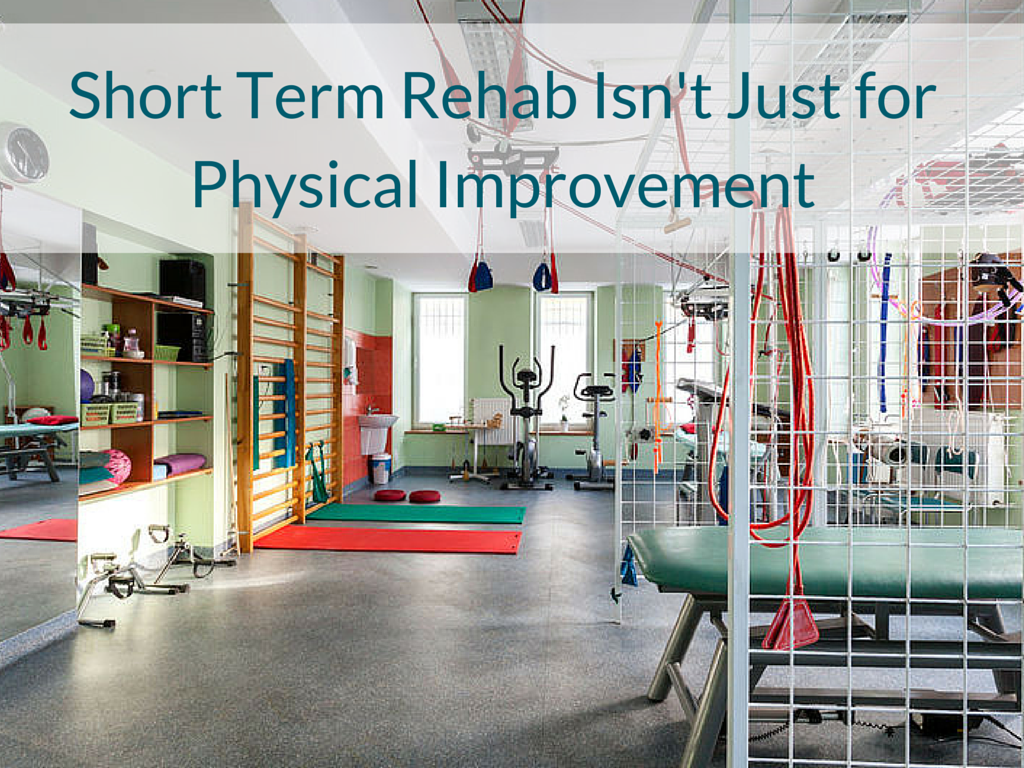
When a parent or other elderly loved one is admitted to short term rehab, you will both have expectations and hopes for the outcome of the treatment they will receive. Many seniors enter such programs afraid of potentially permanent loss of mobility and independence or of the pain they might experience during the course of the care. This can be difficult for you as a caregiver, child, or loved one, but your support and understanding can help them through this challenge.
What is Short Term Rehab?
Short term rehab typically refers to an inpatient program that helps an older adult readjust to life at home after an inpatient hospital stay.
Depending on the needs of the patient, treatment can last a few days or several weeks. For seniors, the focus of short term rehab is to improve physical and cognitive function, allowing people to return to their homes and communities at the highest level of independence possible.
A treatment team is often assigned to each temporary resident, and therapists are selected based on an individual’s diagnosis and the expected outcome of care. You can expect your parent’s basic treatment team to include a physician, nurse, physical therapist and occupational therapist. Depending on your loved one’s needs, the team may also include a speech/language pathologist, social worker, orthotics/prosthetics specialist, ophthalmologist, or audiologist.
Many seniors who successfully complete these programs find that they have achieved more than they expected in areas they hadn’t anticipated.
Mental Benefits of Short Term Rehabilitation
Short term rehab is different from a residential program in that all care is, by nature, limited in scope and duration. The goal is to get patients up and moving, gaining strength, endurance, flexibility, and mobility which will hopefully result in a return to independence. There are other, often unexpected, benefits of these programs on seniors, however—improved mental health, reduced stress, diminished depression, and established sense of wellbeing.
Several studies have documented the link between physical activity and mental acuity in seniors. Often, treatment at a short term rehabilitation program takes advantage of this relationship and benefits your loved one through:
Improved Cognition. The forced activity of physical and occupational therapy can help your older parents improve their overall mood and cognitive function. The routine movements and exercises used in treatment can alleviate stress and result in overall improved mental health.
Renewed Confidence. After a fall or other injury, many seniors are apprehensive about physical activities and isolate themselves at home, which can lead to or exacerbate depression. A successful stay in short term rehab can help your loved one have the confidence in their physical abilities to remain active and socially connected after discharge.
Improved Sense of Self-Worth. Inpatient rehabilitation is hard work: seniors must complete therapy exercises for two or more hours a day for 5 to 7 days per week. The goal for each patient is to maximize their level of independence in activities of daily living and mobility. Many participants are highly motivated to achieve these goals and their success can lead to pride of accomplishment and renewed commitment to physical activity and overall health.
Reduced Depression. Your parent’s success with this program is likely to help with any depression that might have been experienced before or during the hospital stay. The level of physical activity required by the program will also help alleviate the symptoms of depression as will interactions with treatment team and fellow residents.
If your loved one is admitted to a short term rehab program, work with the care team to understand the treatment plan and expected outcome. Learn about what you can do to support the process. In addition to the expected physical gains from the therapies, don’t be surprised to find that your parent also ends up with a revitalized mental outlook as well.












